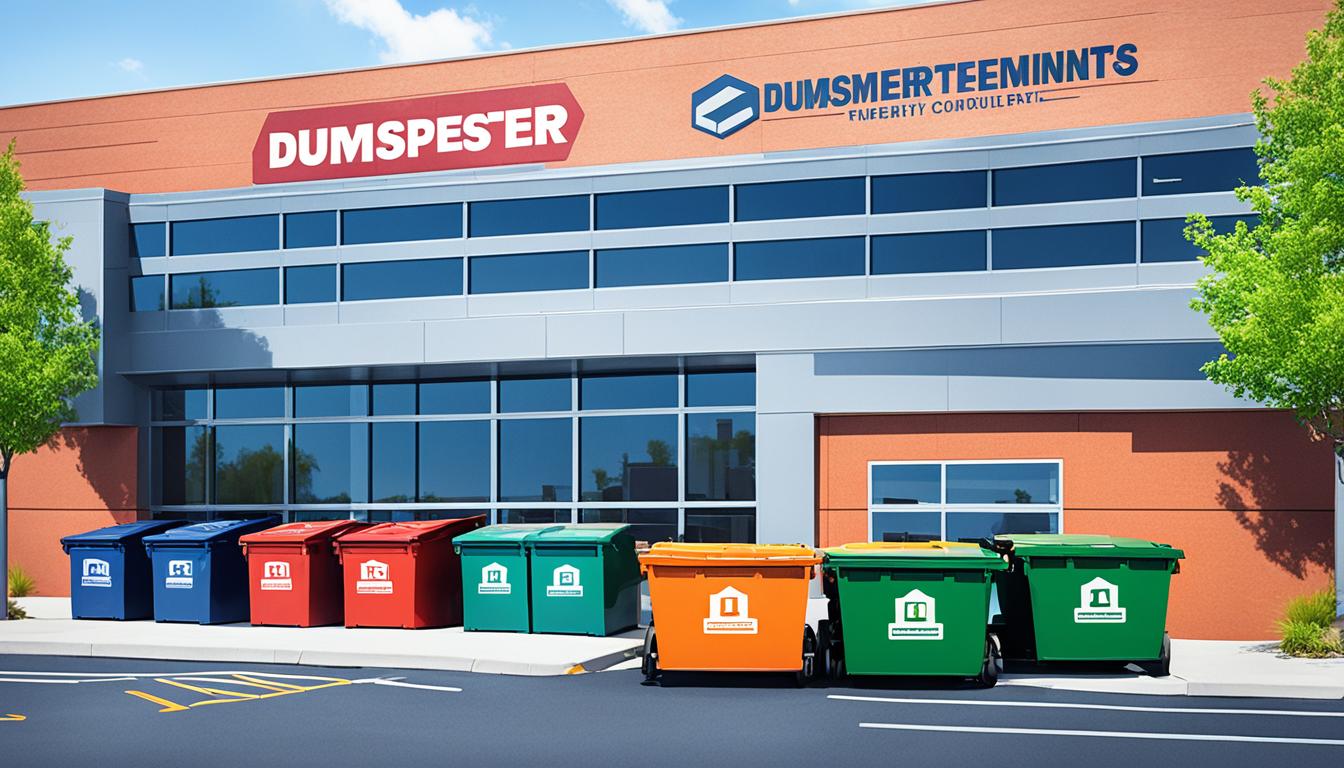If you’re looking for a profitable business opportunity, starting a dumpster rental business might be the right path for you. With the increasing demand for waste management services, the dumpster rental industry is experiencing steady growth in the United States. Whether you’re aiming to cater to residential customers or serve construction companies, there are plenty of opportunities to find your niche in this thriving market.
In this article, we will guide you through the essential steps to start a successful dumpster rental business. From conducting market research to building strong customer relationships, we’ll provide you with the knowledge and insights you need to launch your venture confidently.
Key Takeaways:
- Starting a dumpster rental business can be a highly profitable opportunity due to the increasing demand for waste management services.
- Conduct thorough market research to ensure there is a demand for dumpster rental services in your area, and identify your target market and niche within the industry.
- Estimate your operating expenses and start-up capital costs, taking into account factors such as equipment, permits, insurance, and staffing.
- Develop a strong marketing strategy to promote your dumpster rental business and explore potential partnerships with contractors and construction companies.
- Implement measures to protect your business from non-payment, such as requiring upfront payments and establishing clear payment policies.
Researching Your Local Waste Management Market
Before launching your dumpster rental business, it is crucial to conduct thorough research on the local waste management market. This market research will provide valuable insights into the demand for dumpster rental services in your area and help you identify a profitable niche within the waste management industry.
To start your research, consider reaching out to local rolloff dumpster businesses in your area. Contact them to gather information about their services, rates, and available dumpster sizes. This firsthand information will give you a better understanding of the competition and pricing in your local market.
Additionally, take advantage of online resources such as review websites to read customer reviews of local roll-off businesses. Understanding the levels of customer satisfaction and the pain points customers have with existing service providers can help you tailor your offerings to meet the needs of your target market.
Another valuable tool to utilize in your research is performing a SWOT analysis. This analysis will allow you to evaluate the strengths, weaknesses, opportunities, and threats of starting a dumpster rental business in your specific area. By identifying the market gaps, potential opportunities, and competitive advantages, you can position your business for success.
Remember, researching your local waste management market is a crucial step in establishing a solid foundation for your dumpster rental business. By understanding the market demand, analyzing the competition, and identifying a niche within the industry, you can develop a strategic business plan that sets you apart from others and maximizes your chances of success.

Identifying Your Market Niche
When starting a dumpster rental business, it’s important to identify and target a specific market niche. By focusing on a specialized area, you can differentiate yourself from competitors and provide unique value to your target customers. Here are some strategies to help you identify your market niche:
Serve Specific Customer Segments
One way to find your niche is by serving specific customer segments within the waste management industry. For example, you can target residential remodeling businesses that often require dumpsters for construction debris. Another potential niche could be urban areas with limited access for larger trailers, where smaller and more maneuverable dumpsters are in high demand. By understanding the needs of these customer segments, you can tailor your offerings and marketing efforts accordingly.
Address Specialized Waste Disposal Needs
Consider catering to customers with unique waste disposal needs. Real estate agents, landlords, roofers, and landscapers are just a few examples of professionals who may require specialized dumpster rental services. By offering customized solutions for their specific waste management challenges, you can attract and retain loyal customers in these industries.
Choosing a market niche allows you to focus your resources, efforts, and expertise on a specific target audience. This specialization can help you establish a strong brand presence and position your business as a trusted and reliable provider of dumpster rental services.

Estimating Operating Expenses and Start-Up Capital Costs
When starting a dumpster rental business, it’s crucial to estimate your operating expenses and start-up capital costs accurately. This will help you understand the financial requirements of your business and make informed decisions.
Here are some key expenses to consider:
- Truck License Fees: Depending on your location, you may need to pay fees for truck licensing and registration.
- DOT Number Fees: If you plan to transport waste across state lines, you may be required to obtain a DOT number, which may involve associated fees.
- Liability Insurance Costs: Protecting your business with liability insurance is essential. Consider the costs of premiums and coverage.
- Permit Costs: Research and be prepared for any permits required to operate a dumpster rental business in your area.
- Equipment Maintenance Costs: Regular maintenance for trucks, trailers, and dumpsters is necessary to ensure their optimal performance. Calculate these costs accordingly.
- Fuel Costs: Estimate fuel expenses for your fleet based on anticipated mileage and fuel prices.
- Tipping Fees: Understand the tipping fees charged by local landfills or waste processing facilities where you will dispose of the waste collected.
- Staffing Costs: If you plan to hire employees, consider salaries, benefits, and any other associated costs such as training or uniforms.
- Marketing Costs: Allocate a budget for marketing efforts to promote your dumpster rental business and attract customers.
In addition to these operating expenses, it’s essential to consider the cost of safety and compliance requirements. This may include obtaining necessary permits and ensuring compliance with waste disposal regulations. Failure to comply may result in fines and penalties that can impact your business financially.
Another significant expense is the purchase of roll-off equipment, including trucks, trailers, and dumpsters. Research different equipment options, compare prices, and evaluate the long-term costs. While cheaper options may seem cost-effective initially, investing in higher-quality, long-lasting equipment can save you money on repairs and replacements in the long run.
Estimating your operating expenses and start-up capital costs is a critical step in building a successful dumpster rental business. It helps you understand the financial aspects of your venture, identify potential challenges, and make informed decisions to ensure the profitability and sustainability of your business.
Marketing Your Dumpster Rental Business and Building Relationships
When it comes to marketing your dumpster rental business, establishing a strong online presence is crucial. Start by creating a free Google My Business listing to increase your visibility in local search results. Additionally, launch a simple website that showcases your services, prices, and contact information.
Don’t underestimate the power of offline promotion as well. Utilize branded decals and signage on your dumpsters and trucks to generate new business and encourage customer referrals. This way, your brand will gain exposure as your dumpsters travel around town, sparking curiosity and inquiries from potential customers.
Building strong relationships with potential customers is another key aspect of marketing your dumpster rental business. Reach out to contractors and construction companies in your target market and establish connections based on fair pricing and quality service. Show them that you are reliable, punctual, and committed to meeting their waste management needs. Building trust and rapport with these professionals can lead to repeat business and valuable word-of-mouth referrals.
Consider exploring partnerships with landfill operators to negotiate lower per-ton rates. By providing cost savings to your customers, you can gain a competitive edge in the market. Additionally, implementing measures to protect your business from non-payment is essential. Consider requiring a valid credit card upfront or charging a small processing fee to minimize the risk of financial loss.




